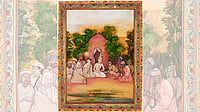When my British pen-friend visited me in Mumbai years ago, I was embarrassed. What a din our incorrigible Radhabai made when washing the dishes, and why on earth did my neighbours holler on the phone?
Then the monsoons arrived. And I saw why we were incapable of being as whispery and decorous as I’d have liked. We took our cue from the bipolar weather gods! The monsoons were our Ms Manners. This wasn’t mercy that ‘droppeth as gentle rain from heaven’. This was life. And it was big. “We are pagan,” I told Brian, jauntily. “Nothing faint-hearted about us.”
Yet, for all their joyous heathenism and love of profanity, the Indian monsoons are versatile. Their vocals range from murmur to howl, their percussion from castanet to nagara. And they are multilingual. They switch dialects all the time. This explains the torrent of onomatopoeia in our song. There’s rimjhim, of course. But I’ve also heard the memorable chatta-chada-chatta-chada-datta, and the many in between—tip-tip, jhir-jhir, kila-kila, ghanana-ghanana, among others.
The problem is we live in a subcontinent whose poets have been warbling about the monsoons since the dawn of time. How then can a contemporary poet not be paralysed by the anxiety of influence? If you look out at a blurry horizon and think of the sky mating with the earth, you realise an ancient Tamil Sangam poet got there a few hundred years before the Common Era: ‘…our hearts are as red earth and pouring rain: mingled beyond parting.’
If a rain-glazed window evokes intense pangs of yearning, you know Kalidasa’s already been there, done that. (The Meghadūta image of a cloud messenger despatched by an exiled lover to his beloved still haunts our collective consciousness more than 1,500 years later). What’s more, Sanskrit poets have described clouds in such inventive ways, it’s difficult to keep track: a damp buffalo’s belly, the breasts of a new mother, raging drunkards, celestial elephants, emeralds in a pearl necklace, fresh mud, heap of collyrium... that’s just skimming the surface of all the metaphorical lushness.

When a rain-glazed window induces a lingering melancholy, you know you are experiencing a much more modest version of what Valmiki’s Rama went through when he spent an anguished monsoon away from Sita. If the wild soundtrack of a south-western storm sounds like the voice of the divine, you realise that the 17th-century mystic poet, Bahinabai, thought so too. “In my heart, God spoke in thunder.” If there’s a surge of voluptuous longing, it’s difficult not to think of all those brazen nayikas who headed out to meet illicit lovers on tempestuous nights. The 15th-century poet Vidyapati writes: ‘Like a vine of lightning,/ As I chained the dark one,/ I felt a river flooding my heart…./ I devoured that liquid face….In my storming breath/ I could hear my ankle bells.’ This is a thunderclap climax—sexual and existential all at once. How does one better it?
Then, there’s Bollywood. Whether it’s O Sajnaa, Ek Ladki Bheegi-Bhaagi Si or Rimjhim Gire Saawan, the fact is they have all got there before us—Shailendra, Majrooh Sultanpuri and Yogesh (with the added blessings of those music composers and vocalists who made them unforgettable).
The truth is, every Indian poet writes a rain poem. There’s no escaping it. It’s a rite of passage. We know the embarrassment of cliché. We know the risk of mediocrity. We know the risk of ending up as poachers and plagiarists. Yet, how can we not? Years after our first experience of them, the monsoons still turn us from horizontal to vertical beings. There we are, full of self-important plans and carefully-constructed identities, busily going about our lives. And suddenly, we are proper nouns no longer; just very soggy beings, gasping, laughing, scrabbling for shelter. The rains make us denizens of this moment, of the same planet. The rains are levellers. They destabilise us democratically—you, me, ‘the ficus/… knocked off the ledge’ and ‘the little moths/ with speckled wings’, as a young poet Kuhu Joshi puts it.
A summer world is prose. A monsoon shower is a lyric poem. The former is stuffy, respectable, and linear. The latter is a slap of wet surprise. Once you have been ambushed by a really good poem, you are drenched for life. Your inner weather is never quite the same again. Being ambushed by an Indian monsoon is quite the same. “Even people seem to become taller in the rain,” says Gulzar.
There’s ecstasy in the air. It has to do with a kind of irrepressible fecundity, and the promise that even devastation can, somehow, be a kind of greenness. As you mourn the fallen gulmohur down the road, the rain’s hypnotic murmur reminds you it is not the end of the story. ‘But sure as the turning days/ There will be other trees/ Wet with rain…/Leaves born with new/ Lines on their palms’, writes Manohar Shetty.
The rains remind us of a less complicated world. A bit like a childhood we all dimly remember, even if we never experienced it. An imagined innocence? Perhaps. But I love it all the same, the sense of belonging to a time ‘when the skies were crazier,/ love purer,/ life simpler,/ when the heart was Malabar,/ the spirit Arabian,/ desire Coromandel,/ laughter more Gene Kelly,/ and words like baarish/and mazhai/ were headier, truer’.
There are the rituals too. Comforting ones, like adrak chai. There’s the comfort of turning archetypal ourselves. When we walk the streets hand-in-hand, we know we are enacting the old-lover archetype (think Raj Kapoor-Nargis and Pyaar Hua Ikraar Hua). When we decide it’s time for bhajiyas, we know there are thousands of households nursing the very same intention. Boundaries blur. Hierarchies fall away. When we look at a solemn schoolboy trudging down the lane, we are there with him, lost in the magic of a world turned aquarium. (And then Elizabeth Coatsworth’s exuberant rhyme returns from some dim recess of the mind: ‘a thunderstorm/ a dunder storm/ a blunder storm…a plunder storm/ a wonder storm!’).
Indian rains are leakier than most. And they invite us to spring a leak too. They drop us from our heads into our bodies. They remind us of what pleasure that leakage can be! And that we are capable of thinking with every singing cell and yodelling pore of our rain-sodden beings. That human intelligence is deeply and happily visceral. ‘There is no better season in which/ to weave the body’s history,’ writes the Tamil poet Kutti Revathi.
It is not all soft-focus romance and pakoras, of course. There’s room for lament and critique too. ‘Why did we think it was trivial/ that it would rain every summer…?’ asks Mamang Dai, in an elegiac poem about Northeast India. For the world changes, and suddenly one day, there’s a new menace in the air: ‘the footfall of soldiers’ begins to grow, even as ‘weapons are multiplying in the forest’. For all their foreverness, the rains can also abscond, as Nabina Das’ poem reminds us: ‘Tell me where trees go to rot, rivers migrate, farmers commit suicide for lack of forever-rain?’
Still, the rains always manage to stay original. Little surprise then that so many spiritual initiations in yogic, tantric, and shamanic traditions involve water. Or that Christian baptism and Islamic purification rituals employ it. Rainwater, in particular, seems potent, and catalytic. It washes off grimy irrelevance; it even seems to alter chemistry. In a savage poem about a traumatised world, EV Ramakrishnan turns to the rain for revelation and clarity: ‘You long,’ he writes, ‘for the script of the slanted rain on the plain/ to tell you the difference between a prayer/ and a false affidavit.’
It’s possible to turn blasé about other seasons. We can ignore them. Increase fan-speeds and air-cooling in the summer. Grab an extra sweater in January. But the rains compel us to become listeners. No umbrella, raincoat or waterproof paint will keep them out. Somewhere, we recognise that to banish them would be folly. Vladimir Nabokov says, “Do not be angry with the rain; it simply does not know how to fall upwards.” But do we really want it to? Here’s one season we can’t browbeat, and we have a hunch that’s a good thing. The Hindi poet Mangalesh Dabral writes: ‘Outside a breeze was blowing,/ there was a little light,/ a bicycle stood in the rain,/ a child was coming home/ I wrote a poem,/ which had no breeze, no light/ no bicycle, no child/ and/ no door’. Keeping out the rain is to keep the doors shut. Our lives, we know, will be poorer for it. Much poorer.
Yes, it’s the Bad Hair Season. The E.Coli Season. The Season of Bread-Mould and Wobbly Wi-Fi. Yet, it is indefinably more. It is the season to be unmade. To allow plans to melt away. Time to be stilled. Time to be liquefied. Time to allow the heart to sing, and time to listen to its song. Time to ‘rub rain into every pore’, as poet Sarabjeet Garcha writes, ‘…so there’s nothing between you and the sleep of trees.’
(This appeared in the print edition as "Time to Sing, Recite & Listen")
(Views expressed are personal)
Arundhathi Subramaniam is a poet and author. Her most recent work is Women who wear only themselves






















